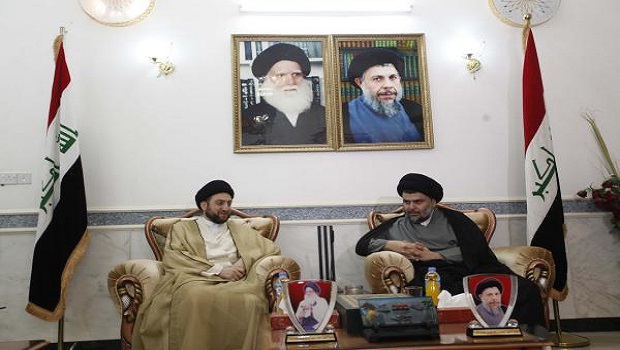
Ammar al-Hakim (L), leader of the Islamic Supreme Council of Iraq (ISCI), meets with Iraqi Shi’ite cleric Moqtada al-Sadr in Najaf, 160 km (100 miles) south of Baghdad, May 8, 2013. REUTERS/Haider Ala
The meeting was chaired by former Prime Minister Ibrahim Al-Jaafari, and attended by Prime Minister Nuri Al-Maliki and Vice-president Khodair Al-Khozaei.
A statement issued after the meeting said “the attendees have expressed their great concern about the recent deterioration in the security situation. They stressed the importance of taking necessary and urgent measures to deal with security breaches and intensify efforts to instill security.”
Amir Kinani, MP for the Sadrist Movement and member of the political committee of the National Iraqi Alliance, told Asharq Al-Awsat that “the meeting of the political committee was frank and direct, and it demanded that Prime Minister Nuri Al-Maliki resolve the issue of vacant ministries within a specific time-frame. The issue of the attacks on the Abu Ghraib and Al-Taji, and the attacks in the capital, were also discussed openly. Al-Maliki explained the circumstance which led to those issues.”
He added that “the Alliance has insisted Maliki refer the security officers responsible for failures to the judiciary without the interference of any political party. It was also emphasized that security officers, especially members of the federal police, must be sent on training programs, and that new security plans which can match the developments in the armed attacks, are introduced.”
Khalid Al-Asadi, MP for the State of Law coalition and member of the political committee of Alliance, told Asharq Al-Awsat that “the National Alliance meeting was important from the point of view of emphasizing the importance of supporting the security forces, who are involved in a ferocious fight against terrorists.”
Meanwhile, Hamid Al-Sa’idi, official spokesman of the Islamic Supreme Council of Iraq (ISCI), denied comments attributed to a leading figure of the party that Iran offered to send members of its Revolutionary Guards to Iraq to participate in security operations. In a statement to Asharq Al-Awsat, he said: “I can confirm that no leading member of the ISCI made a comment of this sort to any media source,” adding that “what we want to emphasize here is that our vision in the ISCI and in the National Alliance as a whole can be achieved by the Iraqis themselves without the help of outsiders.”
